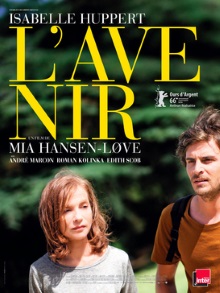
Both this and Elle which I wrote about a few months back were released last year and star Isabelle Huppert. She may not be that well known outside of France but she is the most nominated actress for the César Award, France’s equivalent of the Oscars. Indeed she was nominated for multiple awards for both of these films. Of course the two films were made by different directors, the one here being Mia Hansen-Løve, and she plays very different characters in them.
Both Nathalie Chazeaux and her husband Heinz are philosophy professors at a high school in Paris. In addition to teaching, she also writes textbook and edits collections of essays while taking care of her ailing mother. In particular, she has a favorite student Fabien who has since graduated and become a writer of philosophy himself. The film takes place over a number of years covering big changes in Nathalie’s life. Her two children leave the house to lead lives of their own and one eventually has a child of her own, making her a grandmother. Her husband leaves her for a younger woman though their separation is relatively amicable. As her mother’s condition deteriorates, she is forced to put her in a retirement home. She also visits Fabien who has started a commune in a rural area with some like-minded idealistic friends.
There’s no central overarching plot in this film and no lesson to be imparted save that life brings change and people too change over time. The mood is contemplative but the film is never boring or slow as it flows well and covers the most dramatic moments of Nathalie’s life. Though the dialogue is filled with philosophical discourse and peppered with references to weighty books, that’s not the point of the film. Rather they’re meant to illustrate the rich intellectual lives of the characters and also show how the radical ideas of youth are moderated into milder ones as philosophers age. The enjoyment of watching it is enhanced by its pleasant visuals: the streets of Paris, a cottage by the sea on the Brittany coast, a village at the foot of the French Alps.
One thing that amuses me about Things to Come is how so very, very French it is. There are passionate student protesters who are on strike and want to block fellow students and even teachers from entering the school, Nathalie teaching her students outdoors on the grass, youngsters arguing about whether or not it would be egoistical for authors to put their names on their books, even the very matter of fact way that the two grown-up children approach Heinz to tell him that they want him to choose between Nathalie and his mistress. I find it really quite delightful for that reason. The lack of any overall plot or any larger point does leave me somewhat discombobulated but then I suppose that’s how life works. Overall a find and very watchable drama. In fact, I like it more than Elle, which was the film that ended up winning most of the awards.